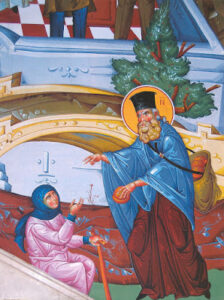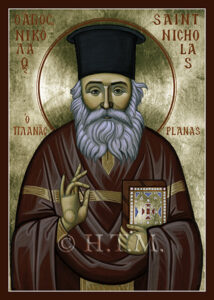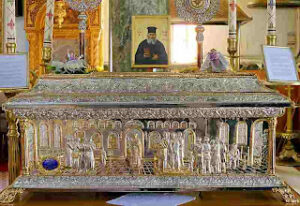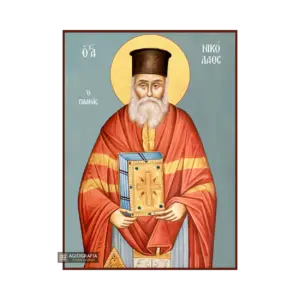Last week we began to tell the story of this humble, quiet, unobtrusive, remarkable parish priest – this Saint of the late Nineteenth and early Twentieth centuries. As I began, I feared there wouldn’t be enough to say about him to fill a Post – and to my surprise here we are in Part Two.
Let’s continue with this:
Papa-Nicholas and his People

He was quite short, even by Nineteeth Century Greek standards. He was hunched over and often looked somewhat disheveled. He usually wore a tattered raso (cassock). In later life his parish wardens would insist upon buying him new clothes. He would give them away. He had a slow gait and in his latter years used a cane.
To people in the various churches where he celebrated Liturgy, he was just the “holy little priest” who comforted their pain. His reputation extended even to other eparchies (dioceses, we would call them). When he came to celebrate the Divine Liturgy, people would hurry to kiss his hand and for him to bless them. All his life no one said anything evil about him. Everyone knew him and respected him.
Rather than correcting people verbally, he would pray intensely for them, so that saints would appear in their dreams to set them straight.
Regarding fasting, Papa-Nicholas was personally very strict, but he was lenient with his people.
To repeat: Great sums of money would pass through his hands, but he would keep nothing. He would immediately give it away to charity. He gave more to young widows because, as he said, poverty tempts them to corruption.
Papa-Nicholas always avoided argument. One time when two people were quarreling in his presence, he hid under the table! not out of timidity or to be silly, but rather to shock them into seeing  they were out of line. He told one of his spiritual daughters, “Do you think, my child, that I don’t know how to speak out? I know, but I think of the results, and so I keep quiet”.
they were out of line. He told one of his spiritual daughters, “Do you think, my child, that I don’t know how to speak out? I know, but I think of the results, and so I keep quiet”.
The following are two condensed versions of incidents recollected and put into writing by a nun, Mother Maria, who knew Papa-Nicholas personally:
1 In the workshop of a home which he visited frequently worked a man who was a devout Communist of the old Bolshevik style, who kept saying all priests should be executed, and he would be the first to do it. When Papa-Nicholas came to visit, first time he went up to the man and said “Good evening”. The man ignored him. The second time, “Good evening, my son”. No response. Then came “Good evening, dear Luke”. Silence. finally came a time when it was, “Good evening, my son, Luke, how are you doing?” To everyone’s amazement, the Communist responded, “Very well, father”. Before it was over, Luke was kissing Papa-Nicholas’ hand when he came visiting! He said, “I still think all priests should be killed – all except Father Nicholas, and I’ll be the first to defend him!” Papa-Nicholas probably didn’t even know the man’s politics * or what he had accomplished. He had “broken through” to this man by simple lovingkindness.
- He didn’t pay any attention to that sort of thing. Once he was present when Greek politics was being discussed. Someone asked Papa-Nicholas his opinion. He paused for a long while, then asked, “Who is the Prime Minister now?”
2 In his pastoral work, Papa-Nicholas was always straightforward. In 1923 one of his beloved children, Elias, a man apparently in the best of health, suddenly had a ruptured appendix. Father Nicholas prayed continually with heartfelt prayer for the man’s healing, but after eight days he came, grief-stricken, to the man’s family and told them, “Elias is going to die.” “How do you know?” “Saint John and Saint Panteleimon have told me.” The man died. It took three months before the man’s sister could ask Father Nicholas exactly how he knew. He told her: “At the time when I was serving Liturgy, I saw the Saints across from me, behind the Holy Table, Saint John and Saint Panteleimon, and they said to me, “We conveyed your request to our Master Christ, who told us that he would die. It came from a Higher Command.”
And that brings us to this subject:
His “Otherworldly” Life
Here are a few of the strange stories that surrounded Papa-Nicholas, including his experiences with saints and angels. If there are any natural-born skeptics here present, feel free to explain these as you wish.

At Divine Liturgy, altar boys would say they saw him shining with light. * People would see him making unexplainable gestures, or remaining silent for a long time, as if something was happening to him. People said he appeared to be communicating with “someone” not visible to them. Occasionally at such times, he would then seem to be surrounded by light.
- Some holy Orthodox men and women tend to “glow”, if that’s not too crude a way to put it. Holy Roman Catholic saints more often have the “stigmata”, the wounds of Christ on their bodies. I’ve heard of no similar phenomena in Anglicanism and Protestantism – except that my Southern Baptist school teacher said that when one deacon in their church really got into his praying, she and the other children used to peek to see the light shining around his head.
Occasionally during Divine Liturgy Papa-Nicholas was seen “floating” above the ground. * One little altar boy ran out to his mother one day, his face white, crying, “Mo.o..m..! Papa Nicholas is this high [about nine inches] in the air!”
- This phenomenon, called levitation, has been observed in a very few saints, both East and West.
This is a story Father Nicholas told about himself: Once he set out on his own to go to a chapel in Peristeri, but he lost his way. He was distressed until he saw a young man in front of him. “Did you lose your way, father? I will guide you.” Father Nicholas followed him till they got to the church. “As soon as we reached outside the door, I turned to give him thanks, and immediately he shone brilliantly, and I lost him.”
He said that during Divine Liturgy he would hear the angels chanting with him. Once he asked a spiritual daughter of his whether she also heard the angels. “No, father, I don’t hear them.” Immediately he said to himself, “I shouldn’t have said it. I shouldn’t have said it…”
For the duration of the half century in which he celebrated Divine Liturgy daily without a break, he never lacked prosphoron (holy bread used for the Eucharist). Invariably some woman would bring it in the night before or some nearby bakery would would provide it for him. One day it was time for the Proskomidi to begin – and there was no bread, none anywhere. He was so distressed that tears were running down from his eyes… after celebrating the Liturgy daily for all these years, how sad to have it end like this. Then suddenly they saw him coming out from the Royal Doors holding the seal of a prosphoron (the central part, the necessary part for the Eucharist), still warm, newly baked, which he had found on the Altar Table! “My children,” he cried, “what a sign God did for me.”

One night, the eve of the feast of the Hieromartyr Phokas, one of his spiritual children saw a majestic priest behind Father Nicholas, chanting the Divine Liturgy with him. Whe she mentioned this to Papa-Nicholas, he said to her, bringing his finger to his lips.”Shh…! don’t say anything. It is the Hieromartyr Phokas.”
Another time a rather fussy woman wanted a priest to say a prayer for healing over her daughter, but she asked for another priest who was not so, well.. not so unkempt in appearance as Papa-Nicholas. That night she had a dream of Father Nicholas dressed in brilliant gold vestments. Next day before she could say a word to him, he asked her, “Were you pleased with the way you saw me last night?” She fell to her knees and begged his forgiveness.
Once a girl from his church was suffering with a fever so high it seemed she might die. Then suddenly she came out of her room perfectly well, saying, “Papa-Nicholas was here and laid his hands on me, and now I’m healed”. But no one, either in the house or nearby, had seem him come or go.
All these events he called signs. * He didn’t try to understand them, and he very rarely talked about them, except to make sure people attributed them to God, not to himself.
- This was true to the New Testament which never uses the word “miracle”.
The Old Calendarist Matter
Before we’re done, we should say something about Papa-Nicholas’ personal devotion to the Old (Julian) Calendar, despite the fact that the Church of Greece moved to the New (Gregorian) Calendar in 1924.
Before we go any farther, for the sake of non-Orthodox and maybe some Orthodox, let me attempt to explain what the Calendar issue is all about. I’ve tried to be fair. If any think I’ve misunderstood anything here, please comment below.
If you already know this, just skip the italicized section.
This has been a major issue among the Orthodox Churches. The problem was that the “Old” Julian Calendar, though an improvement in its time (46 BC), is somewhat out of “sync” with the natural world, so that Christmas now falls fourteen days later, on January 7. The “New” Gregorian Calendar, first introduced by Pope Gregory XIII in 1582, is almost perfectly synchronized with the natural world, so that Christmas still falls on December 25. Some Orthodox preferred to keep the Old Calendar which the Fathers had used. Others gradually accepted the New Calendar, in order to be in harmony with God’s Creation. This is still a division among Orthodox jurisdictions. Russia and Serbia, for example, are still on the Old Calendar. Constantinople, Greece and Antioch, for example, use the New Calendar. The country of Ukraine moved to the New Calendar only this past year, leaving the two Ukrainian Orthodox jurisdictions using different calendars.
All clear now? I didn’t think so.
To avoid total chaos, it is important that parishes follow the usage of their jurisdiction.
When Father Nicholas was asked about his belief, he would reply, “From conviction, the Old, from obligation, the New”. That was the correct answer. Papa-Nicholas continued to commemorate his bishop at every service. He did not go into schism with the small “Old Calendarist Church” which broke away from the Church of Greece and continues to this day. However, in fact he was continuing to serve following the Old Calendar, even when this meant doing so secretly at night!
When news got around, his Archbishop called him in and said to him, “Father Nicholas, I know you are an old man, a good and holy man, much loved by your people. But I hear you are following the Old Calendar.” Papa-Nicholas replied humbly, meekly, “Yes, your Eminence, but only at night.” The Archbishop was completely disarmed and said no more about the matter!
His Death and Burial
On March 2, 1932, the Sunday of the Prodigal Son, Father Nicholas celebrated the Divine Liturgy for the last time. As soon as he consumed the Holy Cup, he suffered a light fainting and was taken home, where his son John and his daughter-in-law Marigoula watched over him. He soon gave up his holy soul to his Lord and Savior whom he had worshiped with such devotion all his life long.
News of the grievous event spread to all of Athens. People hurried to venerate the body of the holy priest and to kiss his hand for the last time. The Archbishop of Athens, Chrysosostomos Papadopoulos, directed that the burial take place at night so that everyone could come.
His body was buried in the courtyard of his little Church of Saint John the Hunter.
Later his bones were placed in a silver reliquary in a large new Church of Saint John the Hunter built in his honor in Vougliameni, which welcomes many pilgrims. There have been a number of miracles – no, “signs” Papa-Nicholas would call them.


In 1992, the Church of Greece, formally asked the Ecumenical Patriarch to recognize Father Nicholas Planas as a Saint. The application began with a personal introduction from His Eminence Nikodemos, Metropolitan of Patras, who when he was young had personally met Papa-Nicholas and had received his blessing. The Patriarchate then issued a Synodical Decree numbering Saint Nicholas Planas of Athens among the saints of the Holy Orthodox Church, and appointed that his memory be celebrated on March 2 each year.
An Afterword
I have never read of a parish priest quite like Papa-Nicholas. He was one of a kind. Nor should any other priest need to be like him – for which I, a former pastor, now retired, am immensely grateful. God gives us each our lights to follow.
However, in his unique, quiet, humble way Saint Nicholas Planas brought a multitude of people to know and love our Lord Jesus Christ and his Saints. And now that he is a Saint of the Church, his work continues and increases.
Holy Nicholas Planas, dear Papa-Nicholas, pray to Christ our God for the salvation of our souls.

_________________
Sources consulted in writing this Post:
johnsadinopoulos.com
https://orthochristian.com/91118.html,
The article, “Papa-Nicholas Planas” in Orthodoxos Philotheos Martyria, Vol.64, Orthodoxos Kypseli ; Publications, January-March, 1996. Translated by Father Nicholas Palis
Holy Transfiguration Monastery, Brookline MA: http://tyoos.org/Lives-of-Saints/February/Feb-17/St-Papa-Nicholas-Planas.html
https://www.ancientfaith.com/specials/orthodox_young_professionals_retreat/work_as_prayer_uniting_our_divided_selves
When Papa-Nicholas healed a Ten Year Old Girl: https://www.mystagogyresourcecenter.com/2023/03/when-saint-nicholas-planas-healed-10.html
Next Week: The Prodigal Son: repentance, forgiveness, stubbornness
Week after Next: John Chryssavgis – “In the Heart of the Desert”